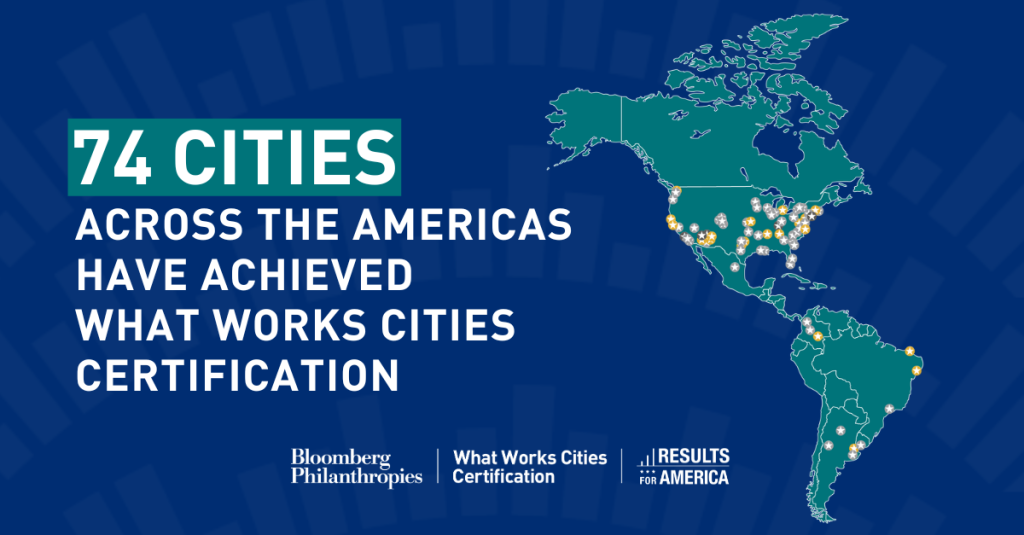Ten Previously Certified Cities Achieve Higher Level of Certification or re-Certify
On January 23, Bloomberg Philanthropies and Results for America announced that 22 cities in North, Central and South America achieved What Works Cities Certification for their exceptional use of data and evidence to make lives better for all residents. Certification is familiar territory for ten of the 22 cities that “leveled up” their Certification or re-Certified.
The What Works Cities Certification Standard is made up of 43 criteria that define what it means to be a city government that makes decisions based on data and evidence. This standard of excellence is developed by leading experts from a dozen organizations and reflects today’s best practices for data-driven government, including the equitable use of data and AI.
Most importantly, the WWC Standard helps cities tie the use of data to results for residents.
There are three levels of Certification
- Silver: cities meet at least half of the criteria (at least 22 of 43 criteria)
- Gold: cities meet more than two-thirds of the criteria (at least 29 of 43 criteria)
- Platinum: cities meet 85% or more of the criteria (37 or more criteria)
The 10 cities below have proven that data guides decision-making in the past, present and future. It’s a testament to commitment, continuity and consistency. In a time when trust in government is low, achieving Certification for a second (or third) time shows that there are local leaders relying on the facts to make their cities stronger, safer, healthier and happier.
The 6 Cities That Earned a Higher Certification Level
- Phoenix, Arizona (Platinum) instituted data governance across departments and continuous community engagement to inform key policies. These policies included the City’s climate action plan, contributing to the average Phoenix resident using approximately 29 percent less water today than the average resident in 1990.
- Tempe, Arizona (Platinum) designed a data management strategy that introduced a new, inclusive demographic standard that is core to the City’s Vision Zero policy. Vision Zero is an evidence-based traffic safety plan—which includes a statistical analysis of a higher propensity for collisions—to reduce the number of fatalities and serious injuries due to crashes to zero. Tempe was also the first city in Arizona to pass a policy mandating the ethical, equitable use of artificial intelligence technologies in city government, which stems from its work as part of the Bloomberg Philanthropies City Data Alliance.
- Boston, MA (Gold) is building a more inclusive city by improving how it asks for gender-identity data. In 2023, the City’s Equity and Inclusion Cabinet investigated how and when the City should be asking about gender identity through a series of data-driven projects including soliciting resident feedback and evaluating the Boston Marriage License experience. Based on the City’s findings, the Cabinet developed a citywide Gender Aware Guidelines and Standards for the collection of gender-identity data.
- Mesa, AZ (Gold) created a strategic dashboard to help park rangers on the front lines supporting unhoused residents. The City launched an internal homelessness dashboard customized for park rangers, who have increasingly worked with unhoused residents in public parks. The dashboard shows types of communication between rangers and unhoused individuals, which city parks have the highest homeless populations, how many contacts involved opioid/fentanyl use, and more.
- Norfolk, VA (Gold) hosted a “Datathon” that led to tree canopy recommendations to reduce extreme heat for low-income residents. The City hosted its first annual Datathon in 2022. Using publicly available data, including tree canopy data from the City of Norfolk, the winners developed a model to better understand which residents were more likely to lack shade. Their findings help Norfolk’s tree planting program prioritize neighborhoods with shade inequity.
- San Jose, CA (Gold) is maximizing AI opportunities and minimizing risk with its new AI practices and framework. San Jose’s new AI Review Framework lays out the process for departments to request AI tools and assess benefits and risks when considering these AI tools. The City is also publicly sharing the purpose and impact of current AI systems.
Additionally, four more cities re-Certified under the updated WWC Standard. These cities achieved 2023 Certification under more intense criteria, updated in 2022, that emphasize equity and resident outcomes.
- Chattanooga, TN (Gold)
- San Francisco, CA (Gold)
- Athens-Clarke County, GA (Silver)
- Madison, WI (Silver)
Congratulations to these 10 cities! We are honored to work with dozens of dedicated leaders in these cities and commend them for this achievement and their impact on residents’ lives. We can’t wait to see what these cities achieve next.
